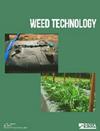Quantifying changes in the environmental impact of in-crop herbicide use in Saskatchewan
IF 1.7
3区 农林科学
Q3 AGRONOMY
引用次数: 0
Abstract
The sustainable management of herbicides is critical to modern agriculture and the environment. This article examines the evolution and environmental implications of herbicide use in Saskatchewan agriculture. It quantifies changes in herbicide use and their environmental impacts by analyzing farm-level herbicide use data from 1991-1994 and 2016-2019 through the Environmental Impact Quotient. Results confirm significant reductions in both the environmental and toxicological impacts of herbicides used, underlining the pivotal shift from tillage-based weed control to herbicide-resistant cropping systems. The environmental impact of the top five herbicides used from 2016-19 is 65% lower than those used from 1991-94, with a 45% reduction in the active ingredient applied per acre. Despite increased herbicide usage due to more crop acres being seeded, the findings highlight a marked improvement in the sustainability of herbicide use, affirming the importance of technological advancements in agriculture. This research contributes valuable insights into long-term trends in herbicide use, offering a practical framework for informed decisions aligning with sustainable agricultural practices as well as reduced biodiversity impacts.量化萨斯喀彻温省使用作物内除草剂对环境影响的变化
除草剂的可持续管理对现代农业和环境至关重要。本文探讨了萨斯喀彻温省农业中除草剂使用的演变及其对环境的影响。文章通过环境影响商数分析了 1991-1994 年和 2016-2019 年的农场级除草剂使用数据,量化了除草剂使用的变化及其对环境的影响。结果证实,除草剂的使用对环境和毒理学的影响均大幅降低,这凸显了从基于分蘖的杂草控制到抗除草剂种植系统的关键转变。与 1991-94 年使用的除草剂相比,2016-19 年使用的前五种除草剂对环境的影响降低了 65%,每英亩施用的活性成分减少了 45%。尽管作物播种面积增加导致除草剂用量增加,但研究结果凸显了除草剂使用的可持续性有了明显改善,肯定了农业技术进步的重要性。这项研究为了解除草剂使用的长期趋势提供了宝贵的见解,为做出符合可持续农业实践的明智决策以及减少对生物多样性的影响提供了实用的框架。
本文章由计算机程序翻译,如有差异,请以英文原文为准。
求助全文
约1分钟内获得全文
求助全文
来源期刊

Weed Technology
农林科学-农艺学
CiteScore
2.90
自引率
21.40%
发文量
89
审稿时长
12-24 weeks
期刊介绍:
Weed Technology publishes original research and scholarship in the form of peer-reviewed articles focused on understanding how weeds are managed.
The journal focuses on:
- Applied aspects concerning the management of weeds in agricultural systems
- Herbicides used to manage undesired vegetation, weed biology and control
- Weed/crop management systems
- Reports of new weed problems
-New technologies for weed management and special articles emphasizing technology transfer to improve weed control
-Articles dealing with plant growth regulators and management of undesired plant growth may also be accepted, provided there is clear relevance to weed science technology, e.g., turfgrass or woody plant management along rights-of-way, vegetation management in forest, aquatic, or other non-crop situations.
-Surveys, education, and extension topics related to weeds will also be considered
 求助内容:
求助内容: 应助结果提醒方式:
应助结果提醒方式:


